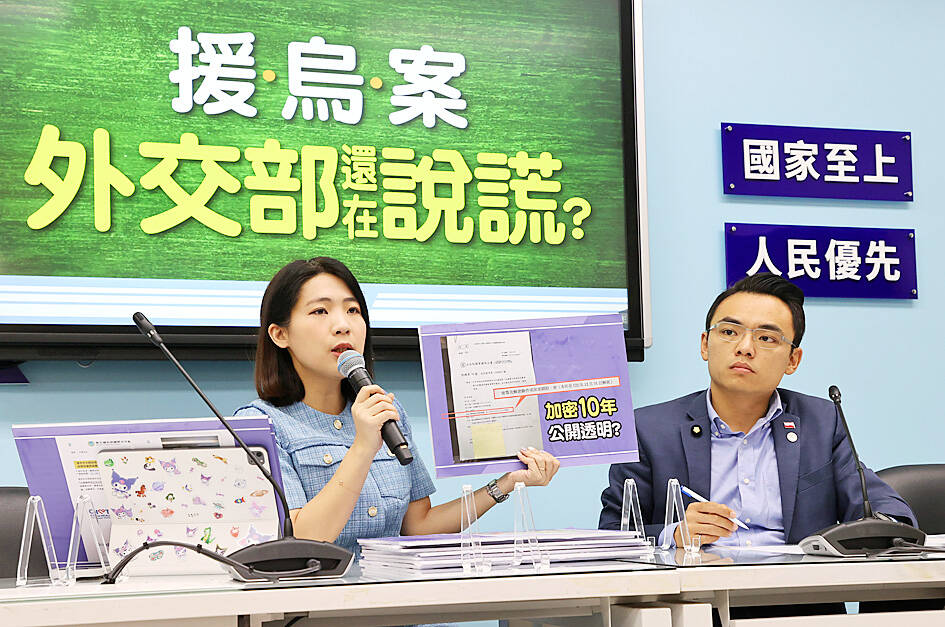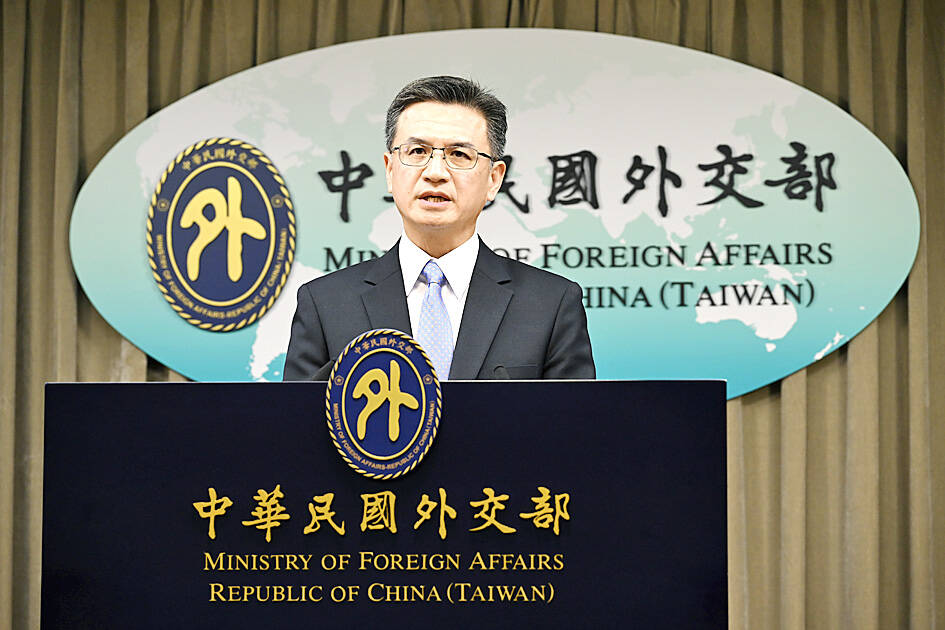Premier Chen Chien-jen (陳建仁) and the Ministry of Foreign Affairs yesterday denounced Chinese Nationalist Party (KMT) Legislator Hsu Chiao-hsin (徐巧芯) for making false allegations about donations to Ukraine and disclosing confidential documents, with the ministry saying that it would take legal action.
The ministry last year signed an agreement with the Czech Republic on a healthcare project to assist Ukraine, which is to be carried out by the Czech Health Technology Institute.
Hsu accused the ministry of being indirectly involved in the party politics of the Czech Republic as institute chairman Petr Foit is a local medical supplier, and has close political and business relations with members of parliament.

Photo: CNA
Taiwan has no official relationship with Ukraine so the majority of projects to assist Ukraine are carried out jointly with its neighboring nations, such as the Czech Republic, Poland, Lithuania and Slovakia, ministry spokesman Jeff Liu (劉永健) told a news conference yesterday.
Central and eastern European nations are more experienced in assisting Ukraine and can communicate with Ukrainian officials directly, he said, adding that the cooperation also strengthens Taiwan’s ties with these nations.
The Czech government has taken cooperation with Taiwan seriously, sending its envoy for the reconstruction of Ukraine to Taiwan to sign the cooperative agreement in person, he said.

Photo: Lo Pei-de, Taipei Times
The agreement was classified given Taiwan’s unique diplomatic situation — cooperation between Taiwan and like-minded nations is often obstructed or undermined, he said.
However, relevant documents were all sent to the Legislative Yuan for review in accordance with legal procedures and can be accessed by legislators, he added.
Legislators can ask for the ministry’s clarification if they have questions about the documents, but they cannot disclose confidential documents to the media, he said.
Hsu on Sunday showed the agreement between Taipei and Prague to the media, using sticky notes to conceal parts of its content.
Asked about the basis of her allegation, Hsu told reporters she “heard about it.”
Liu said Hsu “completely ignored the protection of state secrets.”
Hsu on Sunday said that the information she disclosed had already been made public by the ministry, adding that she was supervising the government to prevent it from taking advantage of secretive agreements to spend money recklessly.
Chen yesterday said that as Taiwan is facing a difficult diplomatic situation, some diplomatic efforts are submitted to the legislature as confidential documents to prevent disruption by malicious third parties.
Hsu’s actions were “very harmful” to Taiwan’s diplomatic efforts and the defense of its sovereignty, he said.
Taiwan should cherish its friendship with other nations such as the US, Japan, the Czech Republic and Lithuania, all of which are willing to support Taiwan, Minister of Foreign Affairs Joseph Wu (吳釗燮) said yesterday.
Democratic Progressive Party Legislator Hung Sun-han (洪申翰) said the documents Hsu showed were received by all 113 legislators, which demonstrated the openness and honesty of the project.
Disclosing the details of the cooperative project is a contravention of Article 132 of the Criminal Code, which stipulates that a public official who discloses secret information relating to matters other than national defense could face up to three years in prison, Hung said.
Additional reporting by Lin Hsin-han

CHAOS: Iranians took to the streets playing celebratory music after reports of Khamenei’s death on Saturday, while mourners also gathered in Tehran yesterday Iranian Supreme Leader Ayatollah Ali Khamenei was killed in a major attack on Iran launched by Israel and the US, throwing the future of the Islamic republic into doubt and raising the risk of regional instability. Iranian state television and the state-run IRNA news agency announced the 86-year-old’s death early yesterday. US President Donald Trump said it gave Iranians their “greatest chance” to “take back” their country. The announcements came after a joint US and Israeli aerial bombardment that targeted Iranian military and governmental sites. Trump said the “heavy and pinpoint bombing” would continue through the week or as long

TRUST: The KMT said it respected the US’ timing and considerations, and hoped it would continue to honor its commitments to helping Taiwan bolster its defenses and deterrence US President Donald Trump is delaying a multibillion-dollar arms sale to Taiwan to ensure his visit to Beijing is successful, a New York Times report said. The weapons sales package has stalled in the US Department of State, the report said, citing US officials it did not identify. The White House has told agencies not to push forward ahead of Trump’s meeting with Chinese President Xi Jinping (習近平), it said. The two last month held a phone call to discuss trade and geopolitical flashpoints ahead of the summit. Xi raised the Taiwan issue and urged the US to handle arms sales to

State-run CPC Corp, Taiwan (CPC, 台灣中油) yesterday said that it had confirmed on Saturday night with its liquefied natural gas (LNG) and crude oil suppliers that shipments are proceeding as scheduled and that domestic supplies remain unaffected. The CPC yesterday announced the gasoline and diesel prices will rise by NT$0.2 and NT$0.4 per liter, respectively, starting Monday, citing Middle East tensions and blizzards in the eastern United States. CPC also iterated it has been reducing the proportion of crude oil imports from the Middle East and diversifying its supply sources in the past few years in response to geopolitical risks, expanding

Pro-democracy media tycoon Jimmy Lai’s (黎智英) fraud conviction and prison sentence were yesterday overturned by a Hong Kong court, in a surprise legal decision that comes soon after Lai was jailed for 20 years on a separate national security charge. Judges Jeremy Poon (潘兆初), Anthea Pang (彭寶琴) and Derek Pang (彭偉昌) said in the judgement that they allowed the appeal from Lai, and another defendant in the case, to proceed, as a lower court judge had “erred.” “The Court of Appeal gave them leave to appeal against their conviction, allowed their appeals, quashed the convictions and set aside the sentences,” the judges